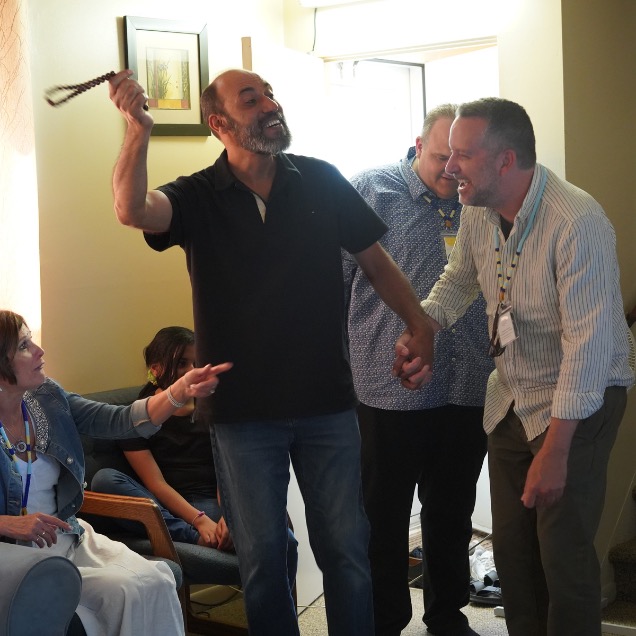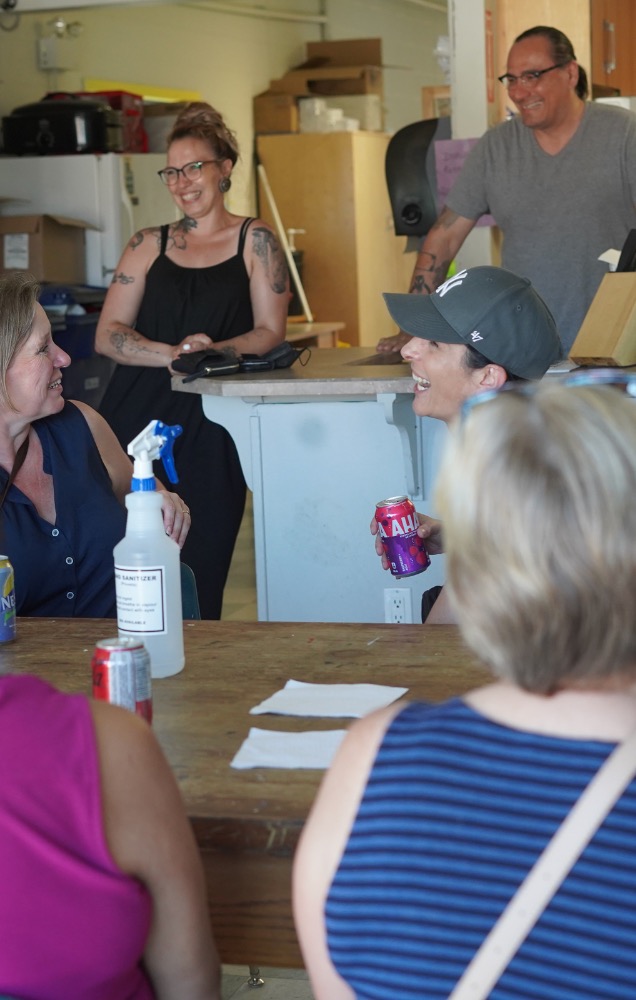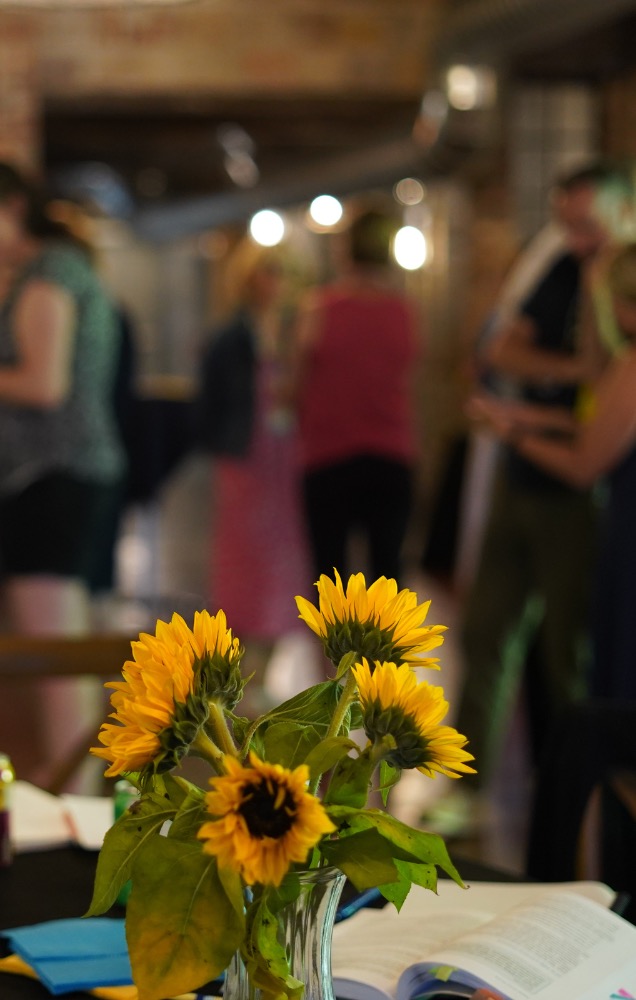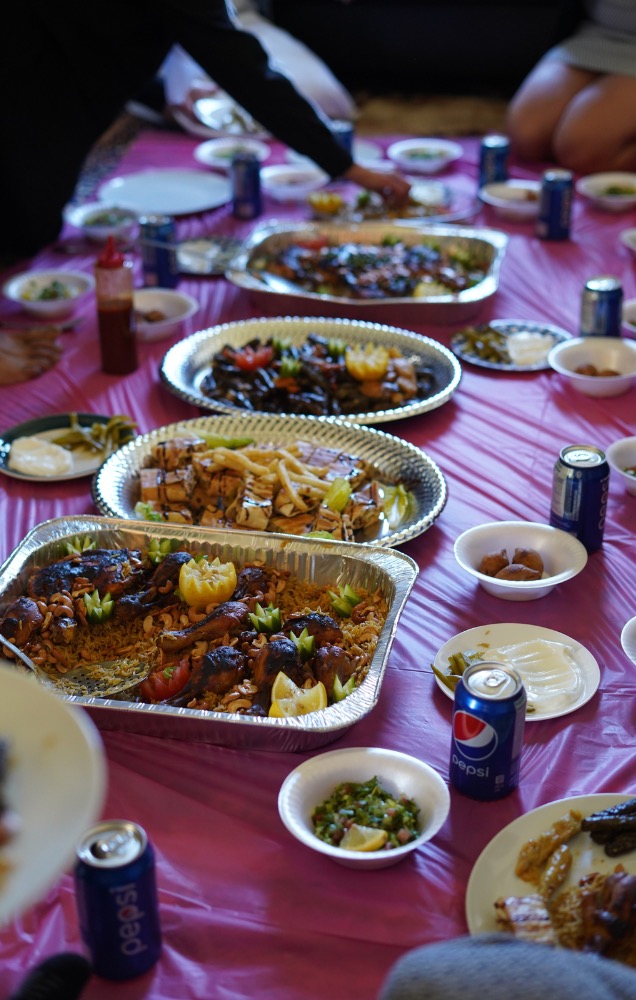In the community
- Home
- In the community
Lunch Time Community Experiences
We believe strongly in learning with and from parents, families, and community members rather than in learning about them. We embrace the adage, “Nothing about us without us.” Further, we believe that change arises as a result of new knowledge and learning that touches our hearts as well as our minds. To that end, a key element of our program is an offering of community experiences in our core and downtown neighborhoods that will provide you with the opportunity to learn from the voices and stories of a range of diverse members of our Saskatoon community.
Led by community members, we believe these experiences will invite you to honestly, vulnerably, and openly make conscious and visible, and interrogate, your beliefs and assumptions about parents and families. We have carefully created learning environments in which it is safe to risk, in which your experiences will be scaffolded, and in which the experiences may be unfamiliar or unlike your own lived experience. As you return to the Remai Modern for think tank and team planning sessions, you will have the opportunity to unpack your experiences alongside key familycentric concepts and documents and work toward co- constructing new parent and family engagement practices that will ultimately translate your new learning and understandings into lived action.
On Thursday and Friday, you will have the opportunity to take part in two of the three lunch time community experiences.


Community Walk
Developing relationships with parents and community members begins with creating opportunities to ‘mingle’ and begin to understand each other, particularly having educators and staff see parents and the community as assets, rather than deficits.
Just as a school leader can create a professional learning opportunity for staff by allotting an hour or two for a community walk in the neighbourhood surrounding the school, we will model such a process for you with a community walk in the core community of Riversdale, across Idylwyld Drive from the Remai Modern. In this lunch time community experience, your purpose will be to identify two or three assets in the community and to introduce yourself to a few parents and community members you meet on your walk. You will have the opportunity to eat the lunch provided for you as you engage with community members and agencies along your route. On your walk back to the Remai, you will talk together about your experiences, the strengths of the community of which you became aware, and how you may use a community walk as an opportunity to come to know more deeply the community in which you work.
Your community walk will be led by a member of the Riversdale community. On your walk, you will make contact with directors of a few local community resources (natural gathering places). As examples, you may meet the executive director of the local food bank, a long standing local business owner, the local health clinic director, a well-known grandparent, or a member of an agency providing transitional services to adults or families. We intend that this activity will create professional learning by shifting the power imbalance that often exists in family-school relationships, by asking participants to risk feelings of vulnerability or discomfort, and by making connections between educational stakeholders and community through a strength-based and asset-focused approach.
STR8 UP Storytelling
On educational landscapes, we work with parents and family members who are or have been incarcerated, who have a criminal record, who may face/may have faced addictions or mental health challenges, or struggle/d to overcome the debilitating effects of poverty. In all of these instances, these circumstances are just one aspect of the individual’s life, not the entirety of their being. How do we ensure, as we work together, that we are seeing parents and family members as the complex and multi-faceted individuals they are, rich with gifts and strengths, rather than stereotyping them with a single label?
Henry (2012) affirmed the critical need for an examination of the beliefs of school personnel regarding the parents with whom they work, particularly parents of families living in marginalized contexts. As Basaraba (2013) passionately stated, “Our first assumptions as educators build the foundation of what will destroy or create an essential family/teacher relationship, a relationship that is crucial to the successful education of all children” (p. 94).
When we get to know, authentically and meaningfully, the parents and family members with whom we work, our assumptions and judgments melt away and positive beliefs replace biases and judgments. In this lunch time community experience, you will have the opportunity to hear the stories of Str8UP members as you walk with them to and from Glass & Lumber and as you share lunch with them as they present the philosophy of STR8 UP. The focus of STR8 UP is relationships. STR8 UP assists individuals in mastering their own destiny and liberating themselves from gangs, addictions, and criminal street lifestyles. The new world into which they enter with STR8 UP is based on cooperation. Positive and healing relationships are based on mutual trust, respect, compassion, honesty, and humility. So, too, are relationships between educators and parents, family, and community members based on these same attributes.


Cooking for Cohesion
The idea of Cooking for Cohesion was developed by a group of young people in Australia who identified multiculturalism as an important issue. We have taken up their idea and have started hosting Cooking for Cohesion sessions as a practice here in Saskatchewan. Cooking for Cohesion involves interactive cooking sessions, inviting participants to experience cultural diversity through the shared enjoyment of food. It is a way to encourage those who are strangers to one another, or unfamiliar with each other, to become closer. The food is a vehicle for the storytelling. It is the storytelling that is central.
A family is invited to prepare their traditional ethnic dishes. While others watch, they learn cooking techniques and are introduced to spices, ingredients, and foods different from the ones they may know and prepare.
During and after cooking, the family shares their personal experiences, stories about their homeland, culture, and religion, and stories of their journey to and settlement in Canada. In the past, we have had families share maps of their home country, play music, sing and/or dance, share photographs and artifacts and, most of all, tell stories of their lives. In one Cooking for Cohesion session led by two Syrian families in a school setting, the Syrian fathers projected photos and video on the screen for all of us to see, introduced us to their homeland, to their families, to many of their cultural traditions. One father shared a video of their former neighborhood, which is now just rubble. It was heartbreaking to see but it taught us all so much of what they have lived through and what they are appreciative of in Canada. At the end of the session, that father said to the large group of participants, “We have shared a meal together. We are now family.”
Through Cooking for Cohesion, we hope to foster personal connections between and among people. As we celebrate the cultural diversity within our community, we believe we will grow in understanding of and in newfound appreciation for one another.
Together We Are Strong!